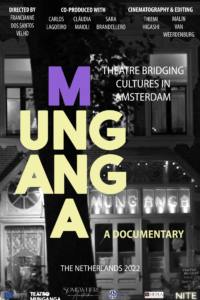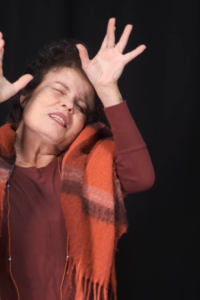MUNGANGA - a documentary
Francianne dos Santos Velho shares her experiences as a research assistant in the HERA project Night Spaces: Migration, Culture and Integration in Europe. She directed the documentary MUNGANGA (2022), which connects with her PhD project on migrant workers in Brazil and the Netherlands.


How do we perceive night spaces? Traditionally, as risks to public order and potential sites of criminality. Despite its often negative connotations, the night has intrigued people’s imagination and plays an important role in our daily lives.
A recent example of the mainstream media that seeks to uncover the ‘mysteries’ of the night spaces is the successful program Nachtdieren (2019 - ) [Noctural Animals] on the Dutch TV channel NPO3. In this show, the presenter, Raven van Dorstui tells sometimes humorous and poignant stories of encounters after dark with all kinds of people from around the Netherlands in public and private places.
Arguing against too simple derogatory notions of the view of the night, Williams (2008) emphasizes that, ‘Night Spaces’ are culturally mediated and socially produced, and as the NITE team is finding, they are key sites of belonging and intercultural exchange. Following Nick Dunn, in his book Dark Matters: a Manifesto for the Noctural City (2016), the nocturnal city is ‘an alternative frame for thinking and being.'
The documentary MUNGANGA (2002) deals with the theme of urban night cultures, and tells the story of a Dutch-Brazilian theatre company and venue in Amsterdam called Munganga, founded in 1987 by Brazilian actors and artistic directors Cláudia Maoli and Carlos Lagoeiro. In the words of Lagoeiro:
When considering migrant communities' experiences, night spaces - material, symbolic and virtual - have played an essential role in navigating and integrating into urban cities. This is what the documentary MUNGANGA (2022) explores. It reveals the significance of the Munganga theatre as a site of crisis and regeneration, memory and heritage, community solidarity and growth, as well as a key venue for independent, night-time culture in Amsterdam. It charts the journey of this important reference for bridging diverse cultures and communities in the city.


Munganga is a Brazilian word of African origin that means communicating through exuberant gestures, expressive faces, grimaces, and dance. The Munganga theatre company thus combines theatre with music, dance and puppetry. In the 90s and '00s, the company enjoyed government support and produced around 115 shows a year for children and youth, often with elements of social critique and influences from Brazilian literature and culture.


Following the 2008 financial crisis and its impact on the cultural sector, Carlos and Claudia had to seek alternatives to their artistic journey. In 2014, they turned their rehearsal space - housed in an old station for horse-drawn trams in South Amsterdam that had been occupied by the squatter movement - into an actual theatre venue. Here, alongside a program of daytime activities, they invested in a rich schedule of night-time performances. This urban night space presented itself not only as an opportunity to overcome an economic crisis but as a place where artistic, cultural, political, and social expressions found new ground. Exploring the night opened up space for themselves, other artists, and groups primarily with migrant backgrounds for community building in a site and a time the potential of which had not been explored fully until then. Munganga is today still a charming and cozy theatre where Carlos and Claudia share the stage with other artists, activists, and dreamers. A welcoming space where multiple diasporic and migrant narratives meet in concerts and plays, lectures and debates, performances, and interventions.

The documentary MUNGANGA (2022) is an output of the HERA funded transdiciplinary collaborative research project Night spaces: migration, culture and IntegraTion in Europe (NITE). This project aimed to answer the question of How are night spaces imagined, produced, experienced, and narrated by migrant communities in Europe? To share (and celebrate) the project’s outputs, the NITE team, from the universities of Leiden, Aarhus, Humboldt, UCL and Limerick, will come together at the conference City Night: Migration and Culture Encounters which will be held at leiden University on 19 and 20 May.


We completed a rewarding journey spanning almost two years of producing this documentary, during which we shared stories and ideas. I did not know that I, a migrant, would find a community myself (as others involved in the project also reported to me). I rediscovered how sharing meals, slices of cake, and cups of coffee while working together is regenerative and brings about new insights. I engaged with the work of other migrant filmmakers, photographers, singers, artists, and scholars, as well with a local journalist and audience. In addition, Munganga and interculturality became a core topic of our discussion in the BA Latin American Studies programme course I am teaching this semester: ‘Migration, Diaspora and Identity in Brazil and the Portuguese-Speaking World’. A student is also writing a BA thesis on Munganga.
It is energizing to see what leaving the University's walls can do to our capacity to listen to stories effectively, allowing us to reach sensibilities and realities hidden behind our piles of books and bureaucracies. Creating collaboratively invokes life and truth. After all, “the night is like a square (…) A nocturnal place of meeting, exchange, knowledge, growth, frustrations and achievements. A permanent state of feeling alive.” And invoking life and truth is an act of understanding, and of responsibility towards, the other, which is urgently needed in our times.
‘MUNGANGA (2022) – a documentary’ will be launched on 20 May 2022, at the City Nights Short Film Fest at Trianon Cinema (Breestraat, 31) in Leiden – with another two documentaries co-produced with the NITE-team in London, and Rotterdam. We are looking forward to seeing you there. You can book a free ticket here!
The Leiden NITE team are: Sara Brandellero, Kamila Krakowska Rodrigues, Francianne dos Santos Velho, Seger Kersbergen, Frans Willem Korsten, Maxime Schut, Angel Perazzetta.
The documentary is the result of the collaboration with Munganga's Carlos Lagoeiro and Claudia Maoli, film artist Thiemi Higashi (from studio Somewhere in Amsterdam), Leiden alumna and student assistant Malín van Weerdenburg and Lorenzo Bragagnolo.
© Francianne dos Santos Velho and Leiden Arts in Society Blog, 2022. Unauthorised use and/or duplication of this material without express and written permission from this site’s author and/or owner is strictly prohibited. Excerpts and links may be used, provided that full and clear credit is given to Francianne dos Santos Velho and Leiden Arts in Society Blog with appropriate and specific direction to the original content.



0 Comments